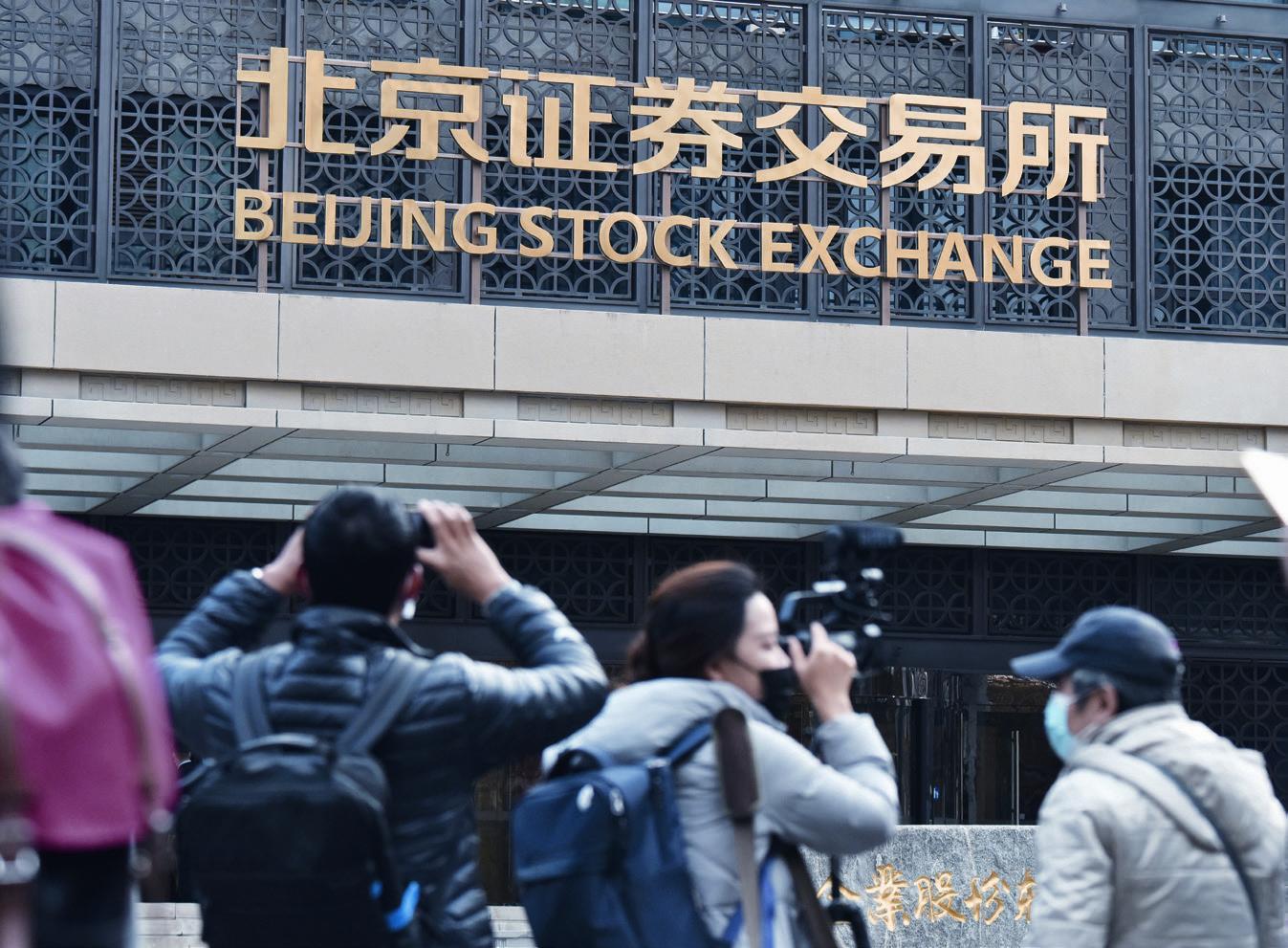Beijing Stock Exchange Formally Opened
By Joyce Lee

November 15 represents a milestone in the history of the reform and development of Chinas capital market. The Beijing Stock Exchange(BSE), which focuses on serving innovative small- and medium-sized enterprises, was formally opened in Beijing.
New start for inclusive finance
On September 2, Chinese President Xi Jinping announced in his keynote speech at the Global Trade in Services Summit of the 2021 China International Fair for Trade in Services that “we will continue to support the innovative development of small- and medium-sized enterprises, deepen the reform of the ‘new third board, and set up the Beijing Stock Exchange to build a base for serving innovative small- and medium-sized enterprises.”
On the first trading day of the BSE, the first batch of 81 companies debuted on the bourse, which highlighted the market position of the BSE as a base for serving innovative small-and medium-sized enterprises.
When looking at the financial data from 2020, the average revenue and profits of the 81 BSE-listed companies amounted to RMB 600 million and RMB 69.38 million respectively. Among these companies, 78 featured revenue of more than RMB 100 million, accounting for 96.3%; and 39 of the companies featured profits of more than RMB 50 million, accounting for 48.15%.
Regarding sales revenue, 10 companies including Nutrichem, BTR, Tongli, Hanbo High-tech and Qiuguan Cable had sales of more than RMB 1 billion. Nutrichem ranked first with total sales of RMB 6.225 billion.
Regarding net profit, 8 companies including BTR, Liancheng Numerical Control, Tongli, Nutrichem and Changhong New Energy Technology had net profits of more than RMB 100 million in 2020. BTR had a net profit of RMB 495 million.
Regarding net profit growth, during the period of 2018 to 2020, the CAGR of net profits of the first batch of 81 companies listed on the BSE reached 28.47%, with a median number of 18.99%. The CAGR of net profits of the top 20 companies reached more than 40%, with 4 companies surpassing 100%.
Yi Huiman, Chairman of the China Securities Regulatory Commission, said that the opening up of the BSE is a new start for the capital market to explore inclusive finance with Chinese characteristics.
Experts say that small- and medium-sized enterprises face issues such as having no qualifications for getting listed, and difficulties and high costs in getting loans and issuing debts. The BSE has relatively loose requirements in terms of the financial conditions for getting listed and encourages innovation. Delisted companies are able to trade at the selected layer or base level of the “new third board”. These rules and mechanisms precisely embody the characteristics of SME stock trading.
Serving innovative small- and medium-sized enterprises
As the worlds second-largest economy, China features more than 40 million corporate entities, with more than 225,000 high-tech companies. The development stage and demands of these companies differ from each other. The investment and financing demands are strong and diversified. The opening up of the BSE will further enhance the abilities of Chinas multi-level capital market to serve SMEs and build a long-term and whole-chain service system to meet differentiated financing demands of SMEs. Chen Jie, researcher and director of the commercial law office of the Law Research Institute of the Chinese Academy of Social Sciences, said that the opening of the BSE shows that Chinas multi-level capital market construction is making great progress towards being more inclusive.
Beijing Tri-prime Gene Pharmaceutical Co., Ltd. will get listed on the BSE. As an innovative pharmaceutical company, Beijing Triprime Gene Pharmaceutical mainly produces recombinant human interferon-α1b, Chinas first genetic engineering Class I new drug with independent intellectual property rights. The companys Chairman & CEO Cheng Yongqing said that the opening of the BSE will promote the integration between technolo- gy and capital, and will mean a lot for the development of innovative SMEs.
Tailored to the characteristics of small- and medium-sized enterprises, the standards for market value and financial performances for getting listed on the BSE are lower than other stock exchanges. For example, the lowest market value required for getting listed on the BSE is RMB 200 million, while the bottom threshold for getting listed on the SSE STAR Market and SSE Growth Enterprise Market is RMB 1 billion. Therefore, the setting up of the BSE will facilitate the direct financing of SMEs, which means that small-cap stock will take the larger share.
Zhao Xijun, Director of the China Capital Market Research Institute of Renmin University, said that the opening of the BSE has great significance for Chinas capital market. First, the role of the capital market in resource allocation and economic operations will continue to be enhanced; second, the setting up of the BSE is the implementation of an innovation-driven development strategy, and will mobilize the power of the capital market to promote economic restructuring, industry upgrading and the development of innovation power; and third is to balance the development between the north and the south of China.
“Compared with the Shanghai Stock Exchange and the Shenzhen Stock Exchange, the BSE mainly focuses on small and emerging companies. New start-up companies will have a large potential for growth, and also feature great uncertainties and fluctuation in their growth. Market managers, agent institutions and investors must fully take both the pros and cons into consideration, and should prepare for the challenges with great patience. The opening of the BSE is of vital importance to the reform and development of the multi-level capital market. We hope everything will go smoothly in the future,” said Zhao Xijun.
Li Xudong, a member of the Investment Bank Commission and Managing Director of China Securities, said, “as Chinas third stock exchange and the board featuring a registration system, the BSE will fully unleash the power and potential of the capital market to inject new momentum into the development of SMEs.”
Liu Pingan, Chairman of GGR Capital, said that the setup and opening of the BSE is a milestone in the construction of Chinas multi-level capital market; it is a big strategic measure to improve Chinas multi-level capital market and is part of the national strategy to promote economic restructuring and develop new growth momentum, and provides practical solutions for solving the financing difficulties of innovative SMEs. “For innovative SMEs, the BSE has evident advantages in terms of the IPO threshold, stock issuance and trading, which are tailored to the characteristics of SMEs and will lower the financing costs of IPOs. For venture capital companies, the BSE has rich corporate resources and will offer more investment opportunities. The opening of the BSE will reshape the PE industry,” he said.
Wang Hanfeng, Chief Strategist of CICC, said that the BSE will attract many “specialized, refined, peculiar and innovative” companies, and will also attract companies in the realms of modern services, consumption and technology. As the scale of the BSE increases, it is expected to breed an industry cluster of “specialized, refined, peculiar and innovative” companies, and a giant cluster of new-generation IT, highend precision manufacturing, new material and new industries companies. Investors should focus on companies with clear advantages in the industrial chain.
“The source of listed companies for the BSE has great potential, but investors need to make their investment decisions in a more professional and prudent way, as innovative SMEs face high risks and fierce competition,” said Zhang Xiaoyan, Deputy Director of the PBC School of Finance, Tsinghua University.
- China’s foreign Trade的其它文章
- Automotives Healthcare and Consumer Electronics Are Top 3 Industries
- Total Sales of the Works of the Top 50 Artists from Hurun Global List Dropped
- The Construction of Central Legal Services Districts Is Forthcoming
- Mediation Greatly Facilitates the Development of Intellectual Property Dispute Resolution
- Accelerating Green Technology Innovation to Achieve Carbon Peaking and Neutrality Goals
- Cross-border E-commerce Market Remained Firm During Double 11 Shopping Festival

